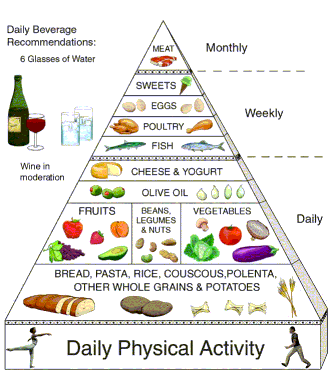
| Landmark Study Demonstrates Benefits of Mediterranean Diet
By Robert Herschbach
Special to Hellenic Communication Service
Olive oil. Wine, consumed moderately. Fish as the main course, but also poultry -- up to four times a week. Less often, red meat. Rice, couscous, breads and pasta. And plenty of vegetables, fruits and nuts. Sound familiar? If you're from a Mediterranean background, it should. These ingredients make up what's become known as the traditional Mediterranean diet, enjoyed by cultures which may have different languages and customs, but which share similar culinary tastes. According to Dr. Antonia Trichopoulou, the region's cuisine doesn't just taste wonderful -- it can also protect your health and bring you a longer life. A research team headed by Trichopoulou found that Greek adults who adhered to their traditional styles of eating had a 25 percent lower risk of dying from coronary disease and cancer than did those who chose Western-style diets. Using detailed dietary information for 22,043 Greeks aged 20 to 86, Trichopoulou gave points for any of the following: eating more fruits, legumes, beans, nuts, whole grains and fish; eating unsaturated fats such as olive oil; and drinking 1-2 glasses of wine daily for men or 1 glass for women. The results, published in June by the New England Journal of Medicine, were striking. Over a four-year period, those with more points were less likely to develop diseases. For every two points, the risk of death dropped sharply. "Olive oil is a gift from heaven which all Mediterranean countries produce," Trichopoulou told the Greek daily Kathimerini in an interview last year, adding that a vast amount of scientific data suggests that the region's diet can contribute to longer lifespans.
The latest findings confirms those of an earlier research project led by Trichopoulou, which focused on elderly men and women in three rural Greek villages. In that study, published by the British Medical Journal, researchers collected dietary data on 182 men and women over 70. Four years later, the team returned -- and found that survival rates of the elderly villagers correlated with their eating habits. The more closely the subjects adhered to the region's traditional dietary patterns, the more likely they were to still be alive and in good health. Because science has not yet determined which particular aspects of a Mediterranean diet work to produce health benefits, it may not be enough simply to choose a few Greek favorites from the menu. Rather, Trichopoulou suggests, the diet should be followed as a whole. The magic may lie in the way the different components work together. Thus, while wine is part of the optimal diet, it should be consumed the traditional Greek way -- during meals, and in moderation. Ironically, the buzz about Mediterranean cuisine comes at a time when changing lifestyles and habits are radically altering the eating habits of many Greeks. And along with those changes have come many of the health problems found in Western Europe and the U.S., where concerns about heart disease and other illnesses have fueled a demand for Greek products. To promote and protect the authentic cuisine, Trichopoulou is urging the government to enact standards and guidelines which will allow mass production of Greek traditional foods without sacrificing quality. Dr. Trichopoulou is Associate Professor of Preventive Medicine and Nutrition at the University of Athens Medical School and Director of the WHO Collaborating Centre for Nutrition in Greece. She was director of the editorial board of the European Journal of Clinical Nutrition and has led and participated in several European projects on nutrition. She has published approximately 100 papers in international scientific journals and authored or co-authored 5 books. Trichopoulou is currently leading the Greek segment of the European Prospective Investigation into Cancer and Nutrition (EPIC) the largest cohort study ever launched in Europe for the identification and quantification of the nutritional etiology of cancer and other chronic diseases. She is also coordinating the effort for the development of a pan-European food databank based on information derived from the household budget surveys (the DAFNE initiative). (Posted August 8, 2003) HCS encourages readers to view other articles and releases in our permanent, extensive archives at the URL http://www.helleniccomserve.com/contents.html. |
|
http://www.HellenicComServe.com |


